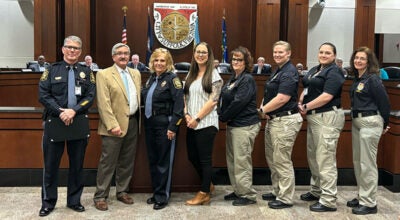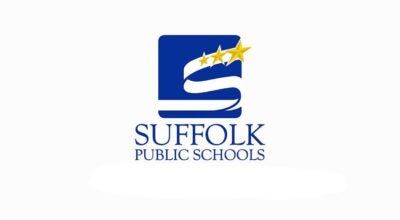Students will stay virtual, for now
Published 9:42 pm Monday, October 26, 2020
|
Getting your Trinity Audio player ready...
|
With the Suffolk School Board split evenly on a vote to reopen schools for students for two days per week, Superintendent Dr. John B. Gordon told members not to expect anything about reopening schools again until its January meeting.
The board voted 3-3 at an Oct. 23 special meeting on a hybrid plan that would have seen students in grades pre-K through 5 return to school beginning Nov. 16, with the remainder of students going back Nov. 30. College and Career Academy of Pruden students would have returned to school once per week at their base school and twice per week at CCAP.
Some special education students are currently in school for two days per week.
Chairwoman Phyllis Byrum, David Mitnick and Lorita Mayo voted in favor of the hybrid plan, with Vice Chairwoman Dr. Judith Brooks-Buck, Tyron Riddick and Karen Jenkins voting against it.
Sherri Story, who had previously expressed support for providing parents with a choice on whether to have their children return to school, was absent from the meeting due to a family emergency.
Gordon said following the vote that the division would revisit reopening schools at the board’s January meeting, with students not returning to school until after the end of the first semester Jan. 29.
However, there could be another vote on reopening schools before then, as board policy indicates that the hybrid plan could be voted on again at the board’s Nov. 12 meeting.
Said Board attorney Wendell Waller following the vote: “That it’s a tie, that means that the motion failed.”
However, School Board Policy Chapter 2, Section 2-6.1B states, “In any case in which there shall be a tie vote of the School Board when all members are not present, the question shall be passed by until the next meeting.”
It is unclear whether the school division would be able to resume in-person instruction under the same timetable that the division proposed, given that it would leave just four days between the meeting and the proposed return to school for students in pre-K through fifth grade.
Those who want to see students return to school have cited concerns about the lack of broadband connectivity, challenges in using the online platform for younger students and the difficulty for special education students to learn online.
Byrum and Mayo cited the lack of broadband as a primary issue in wanting to get students back in school. Byrum represents the Whaleyville Borough, while Mayo represents Holy Neck. Both have large rural areas that struggle with access to the internet, and broadband in particular.
Mayo said that while she is sensitive to the health issues involved in returning students to school, some in her borough cannot access the internet to participate in virtual learning.
“We’re in a different situation than some other board members whose students have great access to internet,” Mayo said.
Byrum said she supported Gordon and his plan, and like Mayo, her borough’s residents have difficulty connecting to the internet for virtual learning. She said many of the students in her borough are suffering as a result.
Brooks-Buck, Riddick and Jenkins expressed concerns with health and safety issues in voting to keep students in virtual learning. Riddick said a majority of the more than 400 comments on a Facebook post on his page supported returning to school in January, something he supports.
“Considering we don’t have all of the data that we needed, it was a hasty approach to push our kids into school,” Riddick said.
He supports allowing students with severe disabilities prior to January, however.
Brooks-Buck said she promised people that she would base her decisions on safety and science first, and in looking at COVID-19 data in the Eastern Region and in Suffolk, she was not comfortable with reopening at this time.
“I kept my promise,” Brooks-Buck said. “Safety first, and science. That’s why I made the decision I made. And I owe it to people to explain. I’m concerned about children, but I’m also concerned about the teachers and staff who have to work with children.”
Jenkins said she liked the division’s plan, but not the timing of implementation.
“I feel that we need to wait, because health and life is my decision in this,” Jenkins said. “There are deaths out here. People are dying from it, young and old, and I just don’t think it is a safe decision with all the different things we are uncertain about right now.”
At its regular meeting earlier this month, the board voted against bringing special education students back to school for four half-days per week.
In a parent survey earlier this month, 64% of the division’s 13,800 students would have returned to school in a hybrid scenario.
Western Tidewater Health District Director Dr. Todd Wagner, responding to questioning from Riddick, said he could not recommend a full return to school for all students, but believed the division’s plan to return students to the classroom was reasonable to minimize the number of students and staff at each school.
“Based on the numbers as I see them today, I think in Suffolk … it is reasonable,” Wagner said. “I think the numbers and the mitigation strategies that I understand are currently in place — again, we can’t forecast exactly how it’s going to go — I have confidence, I would feel comfortable with a recommendation of an in-person instruction. If I did that, I would do it very much in a phased approach. I would also do it in a hybrid approach. That gives you the option of minimizing the numbers of kids that are on campus, and teachers that are on campus.”
Gordon said that because the division cannot move forward with the hybrid plan, division staff would not bring forth a plan to return students to school until either the December or January board meeting — more likely in January, he said .
“We still would need transition for if we did anything else in December,” Gordon said, “as far as trying to start this model over again. The dates that we had chosen were based around the holidays for if there was any quarantining, no loss of instructional time, et cetera.
“So with the board’s decision … just to be clear to our school community, we will stay virtual for the entire first semester. And then we will bring it back to you all for additional discussion in January. At the January board meeting, more than likely, we can determine when the second semester starts in February if we would then bring the hybrid model back up again.”
Mitnick, following the vote, asked whether there was a way to allow for CCAP students to return to school. Gordon said his administrative team has looked at several options, but noted that it would likely have to look at a waiver from the state Department of Education for some of the clock hours needed for the hands-on experiences in CCAP.
Gordon said he plans to discuss with the board at either its November or December meeting plans about midterms and final exams.






